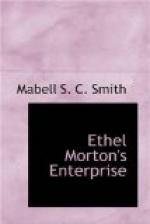“That’s a good choice for your yard because it’s awfully stony and nasturtiums don’t mind a little thing like that.”
“Then I want gourds over the trellis at the back door.”
“Gourds!”
“I saw them so much in the South that I want to try them. There’s one shape that makes a splendid dipper when it’s dried and you cut a hole in it; and there’s another kind just the size of a hen’s egg that I want for nest eggs for Dickey’s hens; and there’s the loofa full of fibre that you can use for a bath sponge; and there’s a pear-shaped one striped green and yellow that Mother likes for a darning ball; and there’s a sweet smelling one that is as fragrant as possible in your handkerchief case. There are some as big as buckets and some like base ball bats, but I don’t care for those.”
“What a collection,” applauded Ethel Brown.
“Beside that my idea of Japanese morning glories and a hop vine for our kitchen regions has no value at all,” smiled Helen.
“I’m going to have hops wherever the vines can find a place to climb at Sweetbrier,” Dorothy determined. “I love a hop vine, and it grows on forever.”
“James and I seem to be in the same condition. If we don’t start home we’ll go on talking forever,” Margaret complained humorously.
“There’s to be hot chocolate for us down stairs at half past four,” said Dorothy, jumping up and looking at a clock that was ticking industriously on a shelf. “Let’s go down and get it, and we’ll ask Mother to sing the funny old song of ‘The Four Seasons’ for us.”
“Why is it funny?” asked Ethel Blue.
“It’s a very old English song with queer spelling.”
“Something like mine?” demanded Della.
Ethel Blue kissed her.
“Never mind; Shakspere spelled his name in several different ways,” she said encouragingly, “Anyway, we can’t tell how this is spelled when Aunt Louise sings it.”
As they sat about the fire in the twilight drinking their chocolate and eating sandwiches made of nuts ground fine, mixed with mayonnaise and put on a crisp lettuce leaf between slices of whole wheat bread, Mrs. Smith sang the old English song to them.
“Springe is ycomen in,
Dappled lark singe;
Snow melteth,
Runnell pelteth,
Smelleth winde of newe buddinge.
“Summer is ycomen in,
Loude singe cucku;
Groweth seede,
Bloweth meade,
And springeth the weede newe.
“Autumne is ycomen in,
Ceres filleth horne;
Reaper swinketh,
Farmer drinketh,
Creaketh waine with newe corn.
“Winter is ycomen in,
With stormy sadde cheere;
In the paddocke,
Whistle ruddock,
Brighte sparke in the dead
yeare.”
“That’s a good stanza to end with,” said Ethel Blue, as she bade her aunt “Good-bye.” “We’ve been talking about gardens and plants and flowers all the afternoon, and it would have seemed queer to put on a heavy coat to go home in if you hadn’t said ‘Winter is ycomen in.’”




